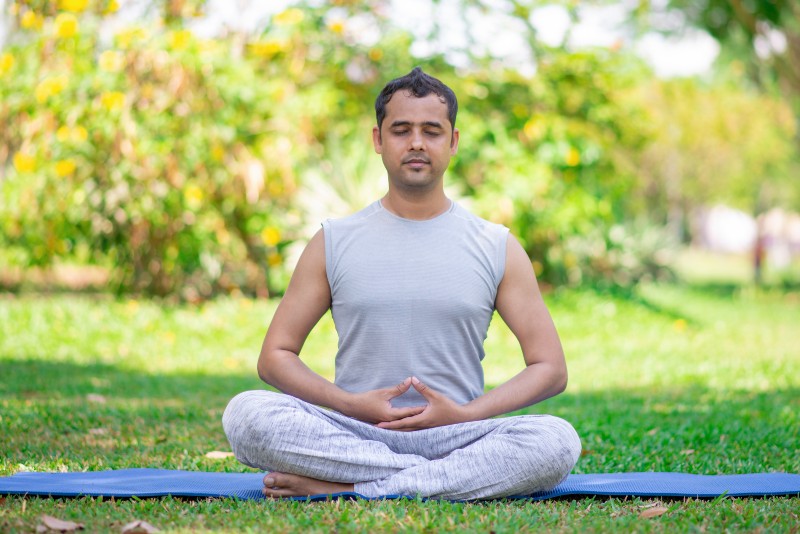The Mental Health Benefits of Yoga
Yoga is an ancient practice that offers significant benefits for mental health. Mindfulness, breathwork, and physical postures within yoga provide the ability to reduce tension and thereby enhance the aspects of focus development, mood intensification, and the building up of emotional resilience. It helps build relaxation, increases self-awareness, and fosters peace within the being, thus making it a good activity for mental well-being.
According to recent research, around 40 million adults in India suffer an anxiety disorder. This is about 3.5% of the population, and I can just imagine the numbers soaring when you look from a global lens.
One of the recent trends to better mental health is yoga. Whether or not you experience stress or anxiety, or just are interested in enhancing your mental life, there’s no doubt that practicing yoga is powerful. So, what are the benefits of Yoga for Mental Health? Let’s find out.

Yoga is not just a physical exercise but a holistic practice that influences the mind, body, and nervous system. The hormones that catalyze stress, such as adrenaline and cortisol, are reduced while elevating feel-good chemicals, such as dopamine and serotonin. Yoga benefits for mental health include reducing stress, enhancing focus, promoting emotional stability, and fostering a sense of inner calm and well-being. For this reason, yoga has increasingly been used as an adjunct therapy for depression, anxiety, and stress. Some of the top mental health benefits associated with regular yoga practice include:
1. Reduces Stress and Anxiety
This is among the most important Yoga for Mental Health. Deep yoga postures and deep breaths instill the parasympathetic nervous system, thus bringing relaxation into a person’s mind. When a person is practicing yoga, it contains gamma-aminobutyric acid, which is a type of neurotransmitter that makes the mind peaceful and reduces symptoms of anxiety.
Moreover, yoga and meditation are intrinsically linked with each other and provide a mental break by reducing the production of cortisol, which is essentially a stress hormone. It teaches you to control your breath as well as focus on the present moment, thereby better handling stressful situations through yoga.
2. Enhances Mood
Mood is also greatly affected by yoga. Regular sessions of yoga have been proven to increase the levels of feel-good chemicals in the body like serotonin and dopamine. This aspect of boosting the mood of yoga is due to the reasons that positively influence brain chemicals that make a person feel calm and happy. Yoga triggers production by increasing blood flow through the brain to the overall perception of well-being.
Certain asana forms, for instance, a child’s pose and forward bends, actually tend to increase mood because these induce introspection and relaxation. In this way, the mental and physical levels of yoga come together, so that a session leaves a participant more centered and positive.
3. Emotional Equilibrium
Yoga classes help create the perfect environment where students learn to control their emotions. Different kinds of asanas and breathing techniques help an individual develop a calm and focused mind, which in turn helps them handle emotions better. Yoga practice teaches individuals emotional resilience, that is, how to stay focused in stressful situations.
As you move through physical postures and breathwork, yoga essentially gives you permission to let go of stored emotions and tension in the body. This emotional release leads to greater emotional stability and fewer mood swings—just so important for long-term mental health.
4. Improves Quality of Sleep
Sleep has to do with mental health and is thus considered one of the ways yoga promotes better sleep. Improved quality of sleep can be most often brought up through practicing yoga; these suppresses insomnia and disturbances during sleep. The body will settle into a restful sleep in yoga practice.
Similarly, practicing yoga and meditation at bedtime can really soothe both the mind and body. This can increase one’s chance of sleeping early and sleeping for a longer period of time. Because of low levels of stress hormones such as cortisol and boosted neurotransmitters that tend to induce feelings of rest, this allows maximum restorative sleep.
5. Increases Mindfulness and Self-Awareness
A critical aspect of yoga involves the message about awareness and self-awareness. Yogic practices can help a person grow more aware of their bodies and emotions. Increased awareness about one’s feelings, thoughts, and reactions helps in better understanding and, therefore, considerably improves mental health issues.
Mindfulness practices in yoga urge participants to be grounded in the here and now without judgment. This being caught up in the now lessens what’s known as ruminating and bad thought patterns in the area of anxiety and depression.
6. Strengthens the Nervous System
It builds up the nervous system for greater resistance to stress. The combination of postures, control of breathing, and meditation forces the body to change from the sympathetic “fight or flight” response to the parasympathetic “rest and digest” response. That helps both body and mind unwind, reducing anxiety and acuity of thought.
7. Mental Strength
Yoga can also build mental toughness in terms of physical challenge. When you push yourself through the most difficult yoga poses, you build your ability to be resilient and calm under pressure. This translates into a stronger, more focused mind that can give its all to the challenges of life.
Also Read : 5 Incredible Health Benefits of Sukhasana (Easy Sitting Pose)
The Science Behind Yoga and Mental Health

Through yoga, many have concluded that it can influence neurotransmitters, which are chemicals in the brain associated with mood and could even change the neurochemistry of the brain to even lessen the symptoms of anxiety and depression.
Also Read – How Can Yoga Improve Mental Health?
However, another study has proven yoga reduces the cortical levels in the body, thus making one better able to respond to stress. Combining movement and breathwork with meditation during yoga provides an effective apparatus to control mental breakdowns.
Explore more about transformative 200 Hour Yoga Teacher Training, 300 Hour Yoga Training India to deepen your practice and enhance your well-being.
FAQs on Yoga For Mental Health
1. How does yoga benefit mental health?
Yoga benefits mental health by reducing stress, improving focus, boosting emotional balance, and promoting overall relaxation. It helps release tension, quiets the mind, and fosters a sense of calm and clarity, leading to better emotional well-being and resilience.
2. Which type of yoga is best for mental health?
What most yoga experts would recommend for better mental health would be restorative and Hatha Yoga. These practices reduce stress and promote mental well-being by focusing on slow movements, deep breathing, and relaxation.
3. How to improve mental health?
Improving your mental health can be simple. Some of these practices include going for therapy during times of crisis, proper sleep, proper diet, mindfulness through yoga, and some form of physical activity, among others.
4. Does yoga make you mentally strong?
Yoga instills resilience and focus in one’s life, thus helping build mental toughness. The physical postures challenge one and translate into greater emotional and mental resilience, which unlocks the practitioner’s day-to-day life.
5. How often should I practice yoga for mental health benefits?
Do practice at least 3-5 times a week for better results. Even a short 10-15 minutes of daily practice can greatly boost your mental well-being with time.
















